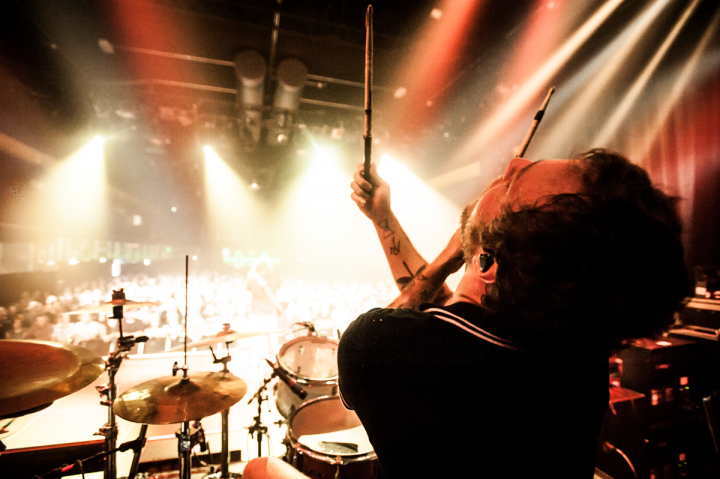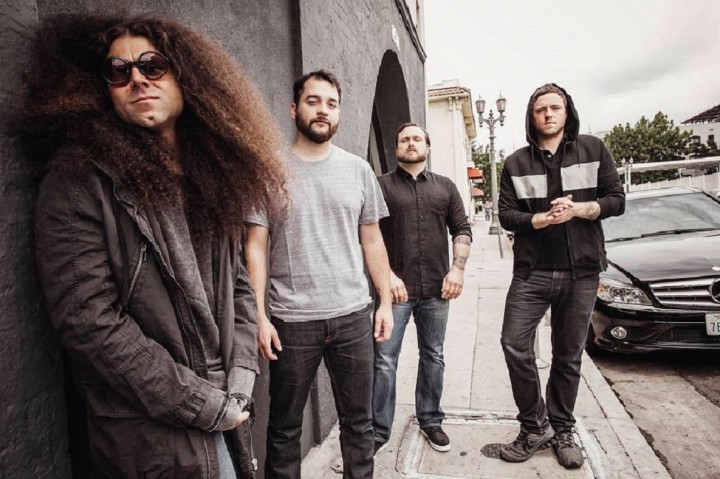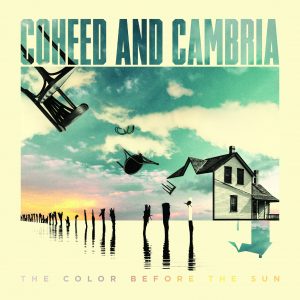Josh Eppard on Coheed and Cambria’s <em>The Color Before the Sun</em>

Josh Eppard By Manuel Casanova
by Stephen Bidwell
Josh Eppard has been out with Coheed and Cambria since this past autumn. The group toured Europe in January, and March will find the band headlining the U.S. with Glassjaw in support. Coheed’s latest studio album, The Color Before the Sun, takes a detour from their seven-album science fiction saga The Armory Wars, and, notably, was tracked live—another novel approach for the band. Modern Drummer Online shot the breeze with Josh last November, right before Coheed threw down a headlining set at Austin’s FunfunfunFest.

Coheed and Cambria: Claudio Sanchez, Zach Cooper, Travis Stever, Josh Eppard
MD: You’ve been playing C&C drums for a long time—any special pieces of gear?
Josh: Bill Cardwell introduced me to C&C when the company was just starting out. I was with Premier, but Bill and my dad are old friends, and they take great care of me. Bill has been an unbelievable supporter of Coheed and Cambria since the early days. Advertisement
The wood snare I’m playing was actually a gift to [Coheed singer/guitarist] Claudio Sanchez. It’s a 5.5×14 wrapped in Abalone, and it’s got the Coheed key works all over it. I’m getting a new kit soon, though. I think I’m ready to go for a 24″ kick. I don’t want to lose the punch, but recently someone had a 24″ C&C as backline, and I wanted to take it from them. I offered to buy it right then and there; you couldn’t make it sound bad.
MD: How about hardware—any preferences?
Josh: You know what pedal I use? This $80 Pearl. I think it’s a step down from the Eliminator. Other companies have sent me their pedals, but there’s something about this one, and they don’t make it any more. There’s just something about those cheap pedals that I’m into. I’ve tried Iron Cobras and DW 9000s, and I look down and feel like they’re playing for me. I don’t feel like I’m doing anything. But those cheap Pearls are faster, and powerful too.
I do this thing when I’m really comfortable where I’ll rest the beater on the head—I don’t do it in the studio, but it’s probably not that big of a deal in a live situation. I can’t do that with heavier pedals, but with the Pearl pedal I don’t get too much bounce. So I absolutely love those pedals. When I bought mine I walked out with the floor model and didn’t even try the different cams. Advertisement
Have you ever seen those old Ludwig Ghost pedals? They have those giant coils on the sides, and if you look at them too hard they might break. I got so used to playing with one of those pedals when I was a kid, and it was frustrating when it went down and we couldn’t fix it. Once you get used to it there’s really there’s nothing like it.
MD: You lead with your left hand. Where did the open-handed concept come from?
Josh: It wasn’t a concept, I was just a dumb kid. I didn’t even want to be a drummer, but I was ten years old and my brother said, “Hey, there’s drums here, why don’t you be the drummer”? And my dad, Jimmy Eppard, who’s a great player and well known around the Woodstock area, was also kind of a hard-ass, and was like, “You’re gonna be a drummer.” I’d seen drummers before but never really had the motivation, but I started learning and I loved it. By the time I was twelve or thirteen my first band got a record deal with Universal and my dad said I should take some lessons. The first thing the teacher said was, “You need to learn a more traditional cross-handed technique,” and my dad kind of flipped out on him. I might play some things cross-handed in the studio, but there’s a lot of ghost notes to paint that pocket, and I’m not all the way there yet with the right-hand-lead approach.
MD: Coheed has some prog leanings; do you have any influences in that department?
Josh: I’m not this big prog guy, and I don’t think any of us really are. John Bonham of Led Zeppelin was doing some really “progressive” things, but I don’t think the general public would think of him that way. We grew up as players, and there was this whole community of kids trying to outdo each other. Not competitive in a bad way, maybe we’d throw nasty stuff in a song that had no business being there. We’ve actually kind of made a career out of that. Advertisement
But I took a lot from the guy that originally played with Claudio and Travis [Stever, guitar] when we were young, Chris Gartmann, and local guys like Jerry Marotta [Peter Gabriel] or this guy Chicken [Robert Burke], who plays with Parliament/Funkadelic. Obviously John Bonham was and is my number-one [influence], and there are players like Stewart Copeland [the Police] and Harvey Sorgen [Hot Tuna]. Watch those guys sit down and play a beat—there’s just something about it. I always wanted to be that kind of drummer. I try to learn from every player I see. If I was the best drummer in the world, I don’t think I would play the drums, because learning and challenging yourself is what’s fun about this job.
MD: I was just reading an old interview with Vinnie Paul of Pantera, and he said he didn’t really dig blast beats because they don’t groove to him.
Josh: That could have been taken right out of my mouth. I’m a funk person; when Coheed first started all the stuff was…I don’t want to say “stiff,” but it was very straight, and they’d never imagined someone putting a backbeat groove on that shit. There’s a song called “Time Consumer” and it’s like [Josh beat-boxes slow Bonham-esque beat]. I think with another drummer it would’ve been [sings double-time punk beat], it would’ve been completely different. And I remember Travis was like, “I really like that hip-hop beat you were playing.” I’d like to think that’s part of the DNA of this band, that it grooves hard.
MD: I’ve read that this was the first record written while Claudio lived in Brooklyn. What was the writing process like?
 Josh: Every Coheed record is different, but this one was really different. We did the whole album in ten days, a song a day. Come in and play it three times, hardly any edits at all. We did it at Neon Cross in Nashville with Jay Joyce. We tracked everything live; it may be more of a live record than most bands’ “live” records. With this record everybody had to gel together because there was no redoing it—if one guy messes up, the whole ship goes down. We certainly added some guitars and things afterward to thicken things up. It was just a very different, live, real way of recording.
Advertisement
Josh: Every Coheed record is different, but this one was really different. We did the whole album in ten days, a song a day. Come in and play it three times, hardly any edits at all. We did it at Neon Cross in Nashville with Jay Joyce. We tracked everything live; it may be more of a live record than most bands’ “live” records. With this record everybody had to gel together because there was no redoing it—if one guy messes up, the whole ship goes down. We certainly added some guitars and things afterward to thicken things up. It was just a very different, live, real way of recording.
Advertisement
MD: Were you all in the same room?
Josh: Most of the time. We did use this one isolation booth, and even though the main room was like this big church, it was the biggest-sounding room. The studio also didn’t have a control room, so I was on a stage kind of above the board, but still facing the engineers.
MD: Tracking live can be scary but very satisfying at the end of the day. Do any moments stand out for you?
Josh: You know…speaking of prog, this record was a lot simpler, by design. I had to do some real soul searching, because I always have goals, and the last record we did (the two-part Afterman collection) was such an astounding success for us. After being around this long we completely re-engaged the fan base and had our biggest record in years. And it was progressive and heavy, and the drums were a big part of that. It was the most Bonham-type shit I’ve ever done, massive and big. But this record is like the opposite of that—simple, tasteful, and I really had to dig back in to that Jerry Marotta kind of world.
There’s a song where I was doing my best Ringo impression, and, you know, I was nervous about it—me being known for a certain thing, and is this going to hold up? Now it’s one of my favorite things that I did. I realize that a lot of the slicker progressive things are there, but they’re just not in your face. I think it’s a real player’s record, even at its simplest. Advertisement
When there’s a lot of notes, there’s not much space to mess up, but when there’s a lot of space there’s a lot of room to mess up. I had to find a way to still be Josh Eppard and find a way to make these songs work, because the band and the producer didn’t want to hear a bunch of stuff. There is one track, “The Audience,” that kind of harkens back to the proggier elements, and it’s a great one. But that’s the only song like it on the record. For your eighth record, if you’re doing something you haven’t really done before, I think that’s a good and healthy thing.
MD: So as a more groove-oriented player, how do you approach odd meters?
Josh: Usually the engineer has to count it out for all of us. [laughs] We don’t know what the count is; we just feel it. None of us ever took lessons, so we’re all just natural players—to a fault sometimes, you know? Claudio sends me ideas sometimes, and it’s a distorted guitar going [Josh sings a series of rhythmic skronks], and I’m like, “Put the click on it where you’re hearing it.” We’re all just natural players, and that’s part of what makes us a special band. I don’t want to sound cocky, but I certainly believe we are. It’s a natural thing, and we’re not saying, “Let’s do three bars of 4/4 and an extra half a beat on that fourth bar.”
MD: How does the writing process work these days with you guys living in different places?
Josh: It’s changed a lot over the years. It used to be that we’d get in a room, Claudio would have a riff and we’d play something, then Travis would write a riff, then I’d write a keyboard part…. I miss those times, to be completely honest. The process now is that Claudio will write a song as a demo and send it to me, I’ll send it back with a drum part that he’ll tell me is too proggy, and he’ll respond with a simpler drum part, and I have to come up with something that’s not…horrible. He wants it to be dope, but that’s been the challenge of this last record—finding a way for it to be Coheed and Cambria but not feel like a Claudio solo record or a way-too-simple version of the band. So demos got sent around, but then we did all get in a room and really hashed it all out together, and that was the most fun I’ve had being in the band in years. Just us, no techs, a kit on a rug where I’d have to put weights in front of the kick to keep it from flying around—it felt like a being a kid again. Advertisement
MD: Do you do any of the show to a click?
Josh: Just a couple songs. I wish the whole show was like that, but the old shit was cut without a click. When I first started playing drums those poor engineers were cutting tape like crazy. I mean, I was twelve years old. I just couldn’t record to a click, and I would curse the drum gods: “Please, no click!” Now I prefer it. It just lets you know where perfect time is. The guys that are really great with a click move around it. It was tough to learn, but you can play with it, get behind it, or get a little in front of it to energize the chorus. I used to be like, “If you’re off, it’s wrong.” But now I can’t fall off, knock on wood…but watch tonight be the night! [laughs] But I’m really comfortable with it, just toying around with the pocket.


